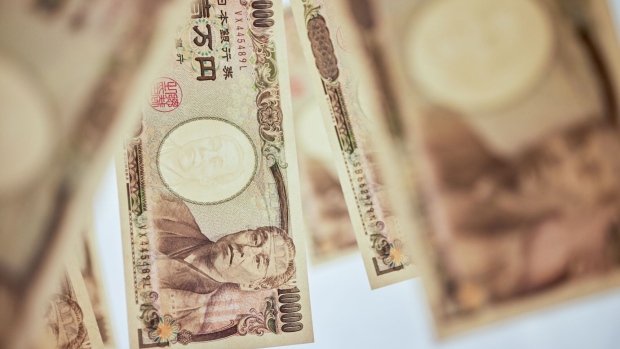Apr 23, 2024
Japan Is ‘Very Close’ to Intervention, Former Forex Chief Says
, Bloomberg News

(Bloomberg) -- Japan is on the brink of currency intervention if the yen weakens any further, according to one of the country’s former top currency officials.
“Amid no change in US and Japan interest rates, the yen has depreciated against the dollar quite rapidly,” said Mitsuhiro Furusawa, former vice minister of finance for international affairs, in an interview with Bloomberg on Tuesday.
“Should this trend continue, intervention will come,” Furusawa said, adding that “we are very close.” He cited market reaction to US data as a factor that may nudge Japanese authorities to act and pointed to last week’s joint statement between Japan, the US and South Korea as an indication that Tokyo’s allies won’t stop it entering the market.
The comments from the former finance ministry official come with Japan’s currency close to Tuesday’s fresh 34-year low of 154.88 against the dollar. Finance Minister Shunichi Suzuki reiterated Tuesday that authorities are prepared for action to address the situation.
Never miss an episode. Follow the Big Take podcast oniHeart,Apple Podcasts,Spotify or wherever you listen. Read the transcript.
The yen continues to look vulnerable with a Bank of Japan meeting this week and the Federal Reserve’s preferred gauge of inflation due out later on Friday.
Furusawa sees the possibility of the BOJ raising interest rates again as early as July, but, like almost all economists surveyed by Bloomberg, he expects no rate change on Friday.
Read more: BOJ to Hold Rates With Focus on Hawkish Signals to Buoy Yen
Market participants and policymakers are wary that the widely expected stand-pat decision on Friday after last month’s historic rate hike may trigger another slide in the currency.
Allowing market players to push the exchange rate can’t be tolerated, Furusawa said. “No one thinks it’s a good idea to leave speculators unchecked,” he said.
Furusawa expects Japan’s authorities to step into the market before the currency reaches 160 yen to the dollar. Some market participants, such as Bank of America Corp., foresee the yen sliding further to 160.
Japan spent around $60 billion intervening in currency markets in September and October of 2022 when the yen approached the 146 and 152 levels.
Last week, Suzuki issued a rare joint statement with US Treasury Secretary Janet Yellen and South Korean Finance Minister Choi Sang-mok in Washington, stating that they would continue to consult closely on foreign exchange developments. The three nations also acknowledged the serious concerns felt by Japan and Korea over the recent sharp depreciation of their currencies.
“With the statement, it’s hard to imagine the US will stop Japan if it actually takes action,”said Furusawa, while noting that the statement does not give Japan a complete go-ahead to intervene.
Read more: Yellen’s Nod to Japan, Korea Adds Scope for Defending Yen, Won
The main factor behind the recent weak yen is the rate differential between Japan and US, according to Furusawa, who now heads the Institute for Global Financial Affairs at Sumitomo Mitsui Banking Corp. Furusawa previously served as the finance ministry’s top currency official from 2013 to 2014 before joining the International Monetary Fund as deputy managing director.
The difference in policy rates between the two countries looks set to remain unchanged until the summer at least, with surveyed economists flagging October as the most likely month for the BOJ to move again.
Governor Kazuo Ueda reiterated in parliament on Tuesday that it’s appropriate to maintain an accommodative environment for a spell, while in the US, Fed Chair Jerome Powell and other officials have signaled that it’ll take longer to cut rates.
“A July hike is a possibility if the bank is convinced it can raise rates after the effects of the income tax rebate and wage hikes are seen,” said Furusawa, referring to a one-off tax break for households dealing with elevated levels of inflation. Unions have secured their biggest annual pay raises in decades this year starting from April.
At its upcoming meeting, the BOJ is expected to project 2% price growth in the fiscal year beginning in April 2026, partly reflecting the optimism surrounding wages and prices. If the bank does so, that may support the case for a July move, Furusawa said. The BOJ could then hike again later in the year, he added.
Weakness in the yen could also be a motive for the bank to move if that starts to affect inflation, but changing monetary to correct currency trends would be difficult, he said.
Read more: Why the Yen Is So Weak and What That Means for Japan: QuickTake
(Updates with market levels, more details)
©2024 Bloomberg L.P.






